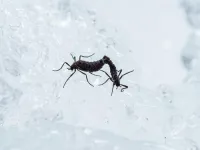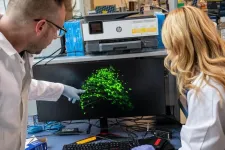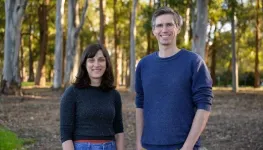(Press-News.org) A collaboration of researchers from Colorado State University and Denver Zoo Conservation Alliance surveyed zoo employees and volunteers across the US about their experiences of burnout and grief related to zoo animal losses.
Their latest study has found that poor grief support in some US zoos leaves staff feeling limited empathy from leadership, burned out, and unable to openly express their grief after the death of an animal to which they had formed a close emotional bond.
The research, published in the journal Human-Animal Interactions, underscores the importance for zoos to prioritize the development of comprehensive grief-affirming policies, training for leadership, and greater access to mental health services.
Scientists also say – to foster empathetic organizational cultures that support staff and volunteer wellbeing and effective animal care – there is also a need to develop communication protocols for timely, compassionate responses to animal loss.
The researchers from Colorado State University and Denver Zoo Conservation Alliance surveyed 1,695 zoo professionals and volunteers across the US and analysed open-ended responses from 182 participants – 135 animal care and health professionals, 12 volunteers, and 35 other staff.
Significant emotional strain due to animal losses
Dr Nichole Nageotte, author of the study adjunct instructor at Unity Environmental University, in the paper said, “Zoo professionals and volunteers frequently face significant emotional strain due to animal losses, yet structured organizational support for processing grief remains limited.”
Participants working in organizations without supportive structures described experiences of loss that resulted in hurt, shame, guilt, or anxiety. Alternatively, participants from organizations with grief-affirming cultures held more positive views. In either case, participants provided concrete suggestions for ways that the zoo industry could be more supportive of staff.
Desire for a culture where they could openly ask for support
The researchers found that while several participants noted positive practices and recognized individuals within their organizations who provide safe spaces to discuss loss and grief, others expressed a desire for a culture where they could openly ask for support, take a moment to catch their breath, and have access to grief resources tailored to the needs of zoo professionals and volunteers.
The scientists said that many participants shared visions for policies and processes to create cultures that promoted better care leading up to animal’s death or transfer and memorialization rituals.
Cultivate a continuing bond with animals no longer under their care
Zoo employees and volunteers desired opportunities for team members to take part in planning for a ‘good death’ or transfer. Specific examples allowed interested individuals the chance to say ‘goodbye,’ take photos, or gather samples of fur, feathers or paw/footprints, therefore enabling zoo professionals and volunteers to cultivate a continuing bond with animals no longer under their care.
The scientists say that to respond to requests for transparency following traumatic deaths, leaders could offer time and space for their teams to debrief about the events leading up to the death, while also allowing people time and space to process their feelings individually if desired.
The scientists offer a range of recommendations for an industry level response to help zoo management build supportive infrastructure and resources that enhance the wellbeing and retention of its workforce.
They say that an initial step could be the creation of a zoo animal grief special interest or advisory group that meets regularly to discuss industry grief culture, share resources, and promote self-compassion around loss.
Suggestions include the development of an online database of grief resources is created so that zoos can share best practice examples of memorial activities – such as photos of meditation spaces – and a directory of zoo counsellors and individuals interested in mentoring others experiencing zoo animal loss.
Full paper reference
Nageotte, Nichole L.; Currin-McCulloch, Jennifer; McDonald, Shelby; Walker, Abby; Kogan, Lori, ‘Animal Loss and Grief in Zoos: Qualitative Insights to Inform Organizational Support for Zoo Professionals and Volunteers,’ Human-Animal Interactions, 12 February (2025). DOI: 10.1079/hai.2025.0004
The paper can be read here from 12:00hrs UK time on Wednesday 12 February 2025.
Media enquiries
For more information and an advance copy of the paper contact:
Dr Jen Currin-McCulloch, Assistant Professor, School of Social Work, Colorado State University – email: Jen.Currin-McCulloch@colostate.edu
Wayne Coles, Senior PR Manager, CABI – email: w.coles@cabi.org
About Human—Animal Interactions
Human—Animal Interactions is an open access interdisciplinary journal devoted to the dissemination of research in all fields related to interactions between non-human animals and their human counterparts.
About CABI
CABI is an international not-for-profit organization that improves people’s lives by providing information and applying scientific expertise to solve problems in agriculture and the environment.
Through knowledge sharing and science, CABI helps address issues of global concern such as improving global food security and safeguarding the environment. We do this by helping farmers grow more and lose less of what they produce, combating threats to agriculture and the environment from pests and diseases, protecting biodiversity from invasive species, and improving access to agricultural and environmental scientific knowledge. Our 49-member countries guide and influence our core areas of work, which include development and research projects, scientific publishing, and microbial services.
We gratefully acknowledge the core financial support from our member countries (and lead agencies) including the United Kingdom (Foreign, Commonwealth and Development Office), China (Chinese Ministry of Agriculture and Rural Affairs), Australia (Australian Centre for International Agricultural Research), Canada (Agriculture and Agri-Food Canada), Netherlands (Directorate-General for International Cooperation, and Switzerland (Swiss Agency for Development and Cooperation). Other sources of funding include programme/project funding from development agencies, the fees paid by our member countries and profits from our publishing activities which enable CABI to support rural development and scientific research around the world.
END
Study examines grief of zoo employees and volunteers across the US after animal losses
A collaboration of researchers from Colorado State University and Denver Zoo Conservation Alliance surveyed zoo employees and volunteers across the US about their experiences of burnout and grief related to zoo animal losses.
2025-02-12
ELSE PRESS RELEASES FROM THIS DATE:
National study underway to test new mechanical heart pump
2025-02-12
ANN ARBOR, Mich. — A cardiac surgery and heart failure team at the University of Michigan implanted a novel mechanical heart pump into a patient as part of a clinical trial that will compare it to the only device currently used to treat end-stage heart failure.
“This trial presents an opportunity to assess novel technology as we explore a potential new treatment for advanced heart failure — a life-threatening condition with extremely limited therapeutic opportunities available,” said Francis Pagani, M.D., Ph.D., national ...
Antarctica’s only native insect’s unique survival mechanism
2025-02-12
Picture an Antarctic animal and most people think of penguins, but there is a flightless midge, the only known insect native to Antarctica, that somehow survives the extreme climate. How the Antarctic midge (Belgica antarctica) copes with freezing temperatures could hold clues for humans about subjects like cryopreservation, but there remain many mysteries about the tiny insect.
One mystery appears to have been solved by an Osaka Metropolitan University-led international research team. Graduate School of Science Professor Shin G. Goto and Dr. Mizuki Yoshida, a graduate student at the time of the research who is now a postdoc at Ohio State University, found ...
How Earth's early cycles shaped the chemistry of life
2025-02-12
A new study explores how complex chemical mixtures change under shifting environmental conditions, shedding light on the prebiotic processes that may have led to life. By exposing organic molecules to repeated wet-dry cycles, researchers observed continuous transformation, selective organization, and synchronized population dynamics. Their findings suggest that environmental factors played a key role in shaping the molecular complexity needed for life to emerge. To simulate early Earth, the team subjected chemical mixtures to repeated wet-dry cycles. Rather than reacting randomly, the molecules organized themselves, evolved over time, and followed predictable patterns. This challenges ...
Ukraine war forces planes to take longer routes, raising CO2
2025-02-12
Global aviation carbon dioxide emissions increased by 1% in 2023 because planes had to fly longer routes to avoid Russian airspace, according to a new study.
After Russia invaded Ukraine in February 2022, Western airlines were banned from flying over Russia. This forced them to take much longer routes between Europe or North America and East Asia, burning more fuel in the process.
Published today (Wednesday, 12 February) in Communications Earth & Environment, the study found that detours caused by the Ukraine war led to planes using 13% more fuel on average compared to their original routes. The impact was even greater for flights between Europe and Asia, which saw a 14.8% increase in ...
Negative refraction of light using atoms instead of metamaterials
2025-02-12
For the first time, scientists have demonstrated that negative refraction can be achieved using atomic arrays - without the need for artificially manufactured metamaterials.
Scientists have long sought to control light in ways that appear to defy the laws of Nature.
Negative refraction - a phenomenon where light bends in the opposite direction to its usual behaviour - has captivated researchers for its potential to revolutionise optics, enabling transformative technologies such as superlenses and cloaking devices.
Now, carefully ...
High BP may develop at different ages and paces in East & South Asian adults in the UK
2025-02-12
Research Highlights:
A data analysis projected that South Asian adults living in the United Kingdom may experience elevated blood pressure nine years earlier than East Asian adults on average.
The largest blood pressure disparities between South Asian and East Asian adults were projected to be in 18-39-year-old men and 40–64-year-old women.
The projected increase in systolic blood pressure in middle age East Asian adults was linked to a nearly 2.5 times higher risk for heart disease caused by blocked arteries and a nearly fourfold greater risk of stroke. Even at an older age, high systolic ...
Meet the newly discovered brain cell that allows you to remember objects
2025-02-12
Take a look around your home and you’ll find yourself surrounded by familiar comforts—photos of family and friends on the wall, well-worn sneakers by the door, a shelf adorned with travel mementos.
Objects like these are etched into our memory, shaping who we are and helping us navigate environments and daily life with ease. But how do these memories form? And what if we could stop them from slipping away under a devastating condition like Alzheimer’s disease?
Scientists at UBC’s faculty of medicine have ...
Engineered animals show new way to fight mercury pollution
2025-02-12
Australian scientists have found an effective new way to clean up methylmercury, one of the world’s most dangerous pollutants, which often builds up in our food and environment because of industrial activities such as illegal gold mining and burning coal. The discovery, published in Nature Communications on 12 February 2025, could lead to new ways of engineering animals to protect both wildlife and human health.
The research team from Macquarie University's Applied BioSciences, CSIRO, Macquarie Medical School, and the ARC Centre of Excellence in Synthetic Biology, has successfully genetically modified fruit flies and zebrafish to transform methylmercury into a ...
The 3,000-year coral reef shutdown: a mysterious pause and a remarkable recovery
2025-02-12
New study reveals that coral reefs in the Gulf of Eilat experienced a surprising 3,000-year "shutdown" in growth, from about 4,400 to 1,000 years ago, likely due to a temporary drop in sea level that could have been caused by global cooling. This phenomenon, which aligns with similar reef interruptions in Mexico, Brazil, and Australia, suggests a widespread environmental shift during that period. Despite the long pause, the reef eventually recovered, with coral species reappearing from deeper ...
Worm surface chemistry reveals secrets to their development and survival
2025-02-12
A new study has revealed the clearest-ever picture of the surface chemistry of worm species that provides groundbreaking insights into how animals interact with their environment and each other. These discoveries could pave the way for strategies to deepen our understanding of evolutionary adaptations, refine behavioural research, and ultimately overcome parasitic infections.
Scientists from the University’s School of Pharmacy used an advanced mass spectrometry imaging system to examine the nematodes Caenorhabditis elegans and Pristionchus pacificus, aiming to characterise species-specific surface chemical ...
LAST 30 PRESS RELEASES:
Ultrasound AI receives FDA De Novo clearance for delivery date AI technology
Amino acid residue-driven nanoparticle targeting of protein cavities beyond size complementarity
New AI algorithm enables scientific monitoring of "blue tears"
Insufficient sleep among US adolescents across behavioral risk groups
Long COVID and recovery among US adults
Trends in poverty and birth outcomes in the US
Heterogeneity of treatment effects of GLP-1 RAs for weight loss in adults
Within-person association between daily screen use and sleep in youth
Low-dose lithium for mild cognitive impairment
Catheter ablation and oral anticoagulation for secondary stroke prevention in atrial fibrillation
A new theory of brain development
Pilot clinical trial suggests low dose lithium may slow verbal memory decline
Bioprinting muscle that knows how to align its cells just as in the human body
A hair-thin fiber can read the chemistry of a single drop of body fluid
SwRI develops magnetostrictive probe for safer, more cost-effective storage tank inspections
National report supports measurement innovation to aid commercial fusion energy and enable new plasma technologies
Mount Sinai, Uniformed Services University join forces to predict and prevent diseases before they start
Science of fitting in: Do best friends or popular peers shape teen behavior?
USF study: Gag grouper are overfished in the Gulf; this new tool could help
New study from Jeonbuk National University finds current climate pledges may miss Paris targets
Theoretical principles of band structure manipulation in strongly correlated insulators with spin and charge perturbations
A CNIC study shows that the heart can be protected during chemotherapy without reducing antitumor efficacy
Mayo Clinic study finds single dose of non-prescribed Adderall raises blood pressure and heart rate in healthy young adults
Engineered immune cells show promise against brain metastases in preclinical study
Improved EV battery technology will outmatch degradation from climate change
AI cancer tools risk “shortcut learning” rather than detecting true biology
Painless skin patch offers new way to monitor immune health
Children with poor oral health more often develop cardiovascular disease as adults
GLP-1 drugs associated with reduced need for emergency care for migraine
New knowledge on heritability paves the way for better treatment of people with chronic inflammatory bowel disease
[Press-News.org] Study examines grief of zoo employees and volunteers across the US after animal lossesA collaboration of researchers from Colorado State University and Denver Zoo Conservation Alliance surveyed zoo employees and volunteers across the US about their experiences of burnout and grief related to zoo animal losses.




